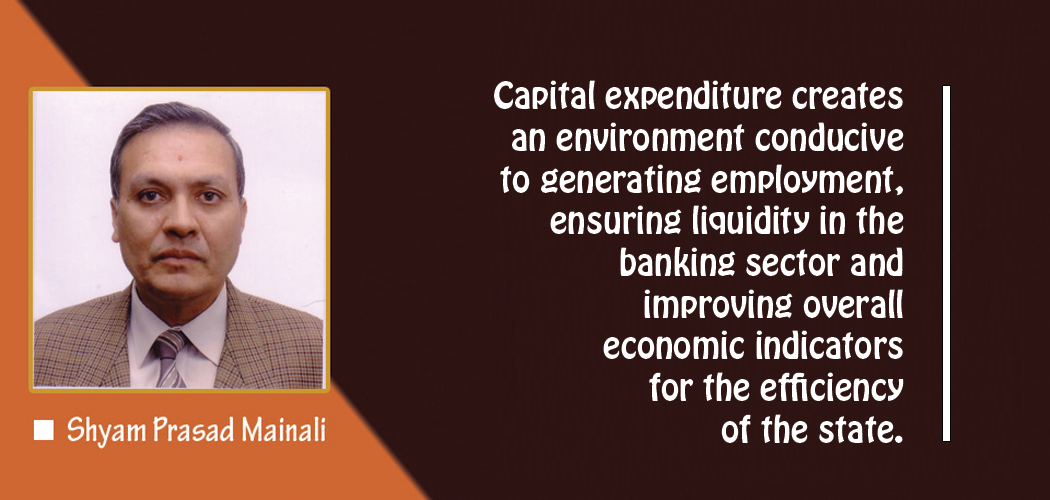- Sunday, 1 March 2026
Boosting Capital Expenditure
Shyam Prasad Mainali
Nepal’s annual budget often hits a snag as the government continues to struggle to spend the capital outlay and promote capital formation. Despite public criticism and government’s commitment to address this issue, the cycle continues. Capital expenditure is essential to enhance the quality and quantity of public service delivery. Large amount of such expenditure is concentrated in the investment of infrastructure especially in the sector of transport, health, education, and research as well. Such expenditure has the potential to positively impact economic growth and development. At a macro-level, it intends to uplift the national economy in an effective manner.
Sufficient attention is given to the prudent use of national resources. Nepal’s capital expenditure is not consistent throughout the fiscal year as it remains sluggish initially and rapidly increases during the last quarter of the year in order to meet targets. This raises questions pertaining to the overall effectiveness of the services and quality of development outputs.
Significance
Capital expenditure is vital for the progress and prosperity of the country. Expenses made in infrastructure development, construction and other sectors help to generate real capital in the economy. Capital budget includes funds allocated for the purposes of executing civil works as well as purchasing land, buildings, plants, and machinery. Low capital spending creates a binding constraint on economic growth, delays the improvement of people's living standards. Successful implementation of the budget depends on the efficient and effective use of capital expenditure.
Capital expenditure creates an environment conducive to generating employment, ensuring liquidity in the banking sector and improving overall economic indicators for the efficiency of the state. Principally speaking, the size of recurrent budget if compared with capital one should be substantially small. In contrast, recurrent expenses account for a large proportion of every year’s budget. The government’s failure to effectively utilise allocation automatically constrained the development works. Capital expenditure itself determines the economic growth rate of the nation. If annual budget is determined to escalate the high economic growth rate, it is essential to reduce the growing burden of recurrent expenses and divert the remaining funds to development purposes.
The state’s inability to use funds has a basis in facts. Around 73.4 per cent of the development budget was spent in the financial year 2018- 2019. In the beginning of the fiscal year, nominal amount of the capital expenditure was spent which stood only 5.5 per cent in the duration of first quarter. It was escalated to 17.68 percent by mid-January or within the duration of first half of the fiscal year. Most of the amount or 57 per cent was spent at the end of the financial year. Approximately, 16.4 per cent was spent in the last week of the fiscal year. Spending heavy amount at the end of financial year compromises the quality of development works. Economists claim that at least 8 to 12 percent of its gross domestic income needs to be spent on the construction of public infrastructure.
The private sector is interested in injecting capital into the economy, but government practices discourage the private sector. The government is playing an important and lead role even to investment in infrastructure as well as public utility goods. Such situation creates insufficient capital expenditure which results in the slow pace of development activities. Impeding development activities automatically affects the creation of employment opportunities and income generation of the general people. Likewise last hour exhaustion of the capital budget also leads to short-lived roads, bridges, and other infrastructure waste the state’s resources.
Slow spending of the capital expenditure is considered the main reason of low circulation of liquidity in the market. Banking transactions are negatively affected. Timely spending helps circulate cash in banks. The large amount of loanable funds in the financial sector for the past few years was an outcome of inadequate and excessive slow pace of capital spending. Due to the insufficient capacity of the line agencies, development budget gets frozen at the end of financial year. Delay in awarding contracts is another cause of this situation. Frequent transfers of personnel without sufficient reason impede necessary preparations.
Way forward
Result-based performance of the concerned personnel is essential. Such evaluation should be based on an objective criterion. The policy of the government to set up a system of performance contract needs to be effectively implemented. Inappropriate and obsolete structure of federalism such as seventy-seven district coordination offices and seven provinces need to be reviewed. Necessary amendments in the Public Procurement Act and other concerned stipulating clear-cut business plan for the whole financial year is essential. Line agencies must formulate a procurement plan for all projects on time. Vigorous training regarding the jurisdiction of federal structure as well as procedural manner to all elected representatives and concerned personnel should be provided. Practice of pouring funds to multiple projects needs to be discouraged.
Emphasis should be given to identify the priority of the project. Redefining the working modality of the whole machineries and expedite the knowledge of experts especially at the local level are important measures for the betterment of escalating and efficiency of the capital expenditure. Institutional capacity development and making machineries efficient is a must. Special training programmes should be launched for the concerned to prepare procurement plans as well as tender documents are among the measures that the government must adopt. Such productive efforts allow for reasonable capital spending right from the first quarter of the financial year.
(Mainali is former government secretary.)
















